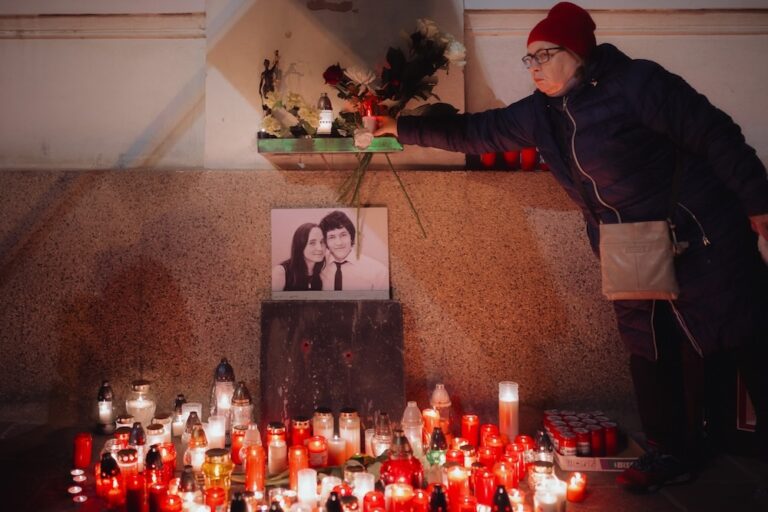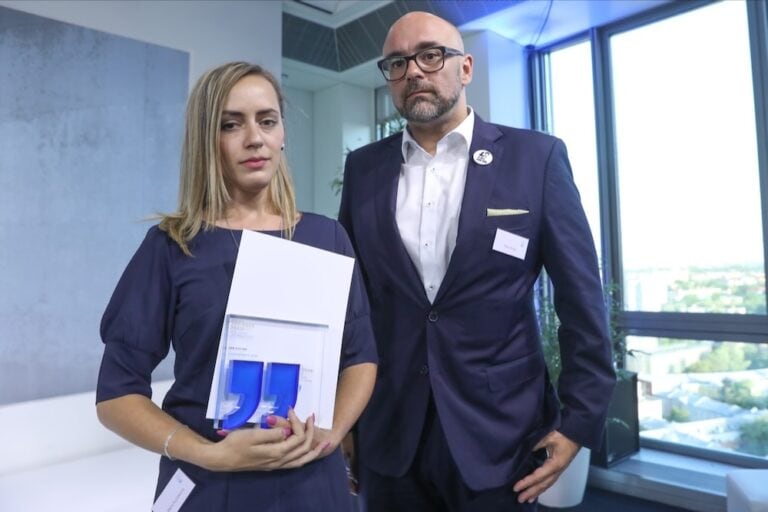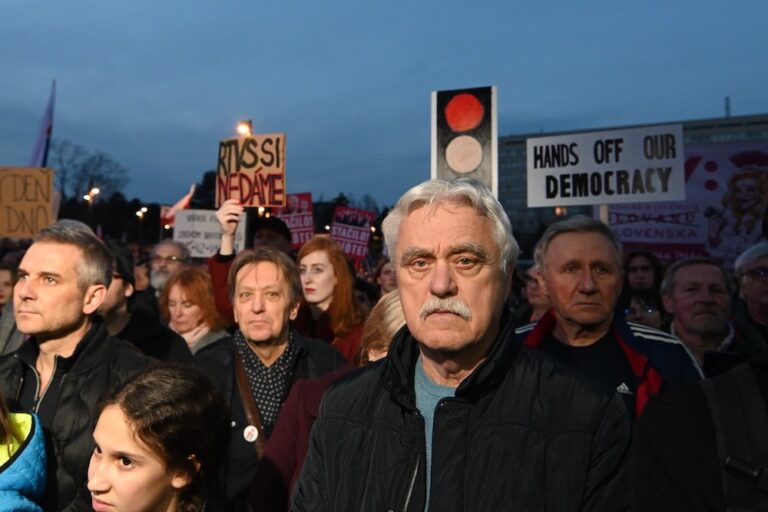(ARTICLE 19/IFEX) – The following comments constitute an analysis by ARTICLE 19, the International Centre Against Censorship, of proposed amendments to Slovakia’s election legislation (Law No 80/1990). These proposed amendments are of great concern to ARTICLE 19 because, if passed, they would limit the freedom of the Slovak media, particularly the private electronic media and […]
(ARTICLE 19/IFEX) – The following comments constitute an analysis by ARTICLE
19, the International Centre Against Censorship, of proposed amendments to
Slovakia’s election legislation (Law No 80/1990). These proposed amendments
are of great concern to ARTICLE 19 because, if passed, they would limit the
freedom of the Slovak media, particularly the private electronic media and
possibly also the printed media, to provide their viewers, listeners and
readers with full coverage of the election campaign. ARTICLE 19 notes that
the proposed amendments are due to be discussed in parliamentary committees
during late April and should come before the National Assembly of the Slovak
Republic (parliament) during May. It should be pointed out that a proposed
amendment to the press law would permit violations of election campaign
legislation to be punishable by a fine ranging from 5,000 to 1 million
Slovak crowns (between $150 and $30,000).
Throughout this analysis, ARTICLE 19 has evaluated Slovakia’s proposed and
existing legislation in relation to international standards for the
protection of freedom of expression and information in general and media
freedom in particular. Should further analysis or more detailed evaluations
of international standards be required, ARTICLE 19 is willing to provide the
information in question.
1. Slovakia’s Obligations to Promote and Protect Media Freedom During
Elections
ARTICLE 19 notes that Slovakia is obliged to protect and promote the right
to freedom of opinion and expression and information, including through the
media, as a result of international treaties to which it is a party,
specifically the European Convention on Human Rights and the International
Covenant on Civil and Political Rights. This obligation arises equally from
Slovakia’s Constitution whose 26th article affirms that:
(1) Freedom of expression and the right to information shall be
guaranteed.
(2) Every person has the right to express his or her opinion in words,
writing, print, images and any other means, and also to seek, receive and
disseminate ideas and information both nationally and internationally. No
approval process shall be required for publication of the press. Radio and
television companies may be required to seek permission from governmental
authorities to set up private businesses. Further details shall be provided
by law.
(3) Censorship shall be prohibited.
(4) Freedom of expression and the right to receive and disseminate
information may be lawfully limited only where, in a democratic society, it
is necessary to protect rights and freedoms of others, state security, law
and order, health and morality.
It should be stressed that the permissible limitations enumerated in
paragraph 4 of article 26 of the Constitution do not relate to regulation of
the media during elections, and are in any case very narrow since they must
be interpreted in the light of the requirement that the restriction is
necessary in a democratic society. At the time of an election, an activity
which itself constitutes a fundamental aspect of the democratic process, the
greatest flow of information should be permitted within the society.
It should also be noted that the Slovak government’s obligations under
international treaties (such as the European Convention on Human Rights) and
its own Constitution include the obligation not just to refrain from
restricting freedom of expression and information, but also to promote these
rights. This obligation requires that the Slovak government takes all
measures to actively promote freedom of expression and information through
any media, including the mass media, at all times. This obligation is
particularly strong at the time of an election so that the electorate is
fully informed about the parties, politicians and differing political
platforms in order that they be able to make an informed choice at the
ballot box. ARTICLE 19 thus strongly urges the Slovak authorities not to
impinge upon the freedom of the media during the elections through their
creation of special electoral campaign press laws.
2. The Proposed Amendments to the Election Law at Article 23
2.1 Coverage of Election Campaign by Private Media
It is of particular concern to ARTICLE 19 that article 23, paragraph 1 of
the election law includes the provision that, during the 30-day official
campaign period, only the state-funded media may broadcast activities
relating to political campaigns (“election campaigning on radio and
television stations of [private] license holders is prohibited”). To
prohibit private radio and television stations from airing election related
programming, whether it be news, reports, or campaigning broadcasts,
undermines the freedom of expression and information of both broadcasters
and the general public.
Whilst it is acceptable that only state-funded media be allowed to carry
political party broadcasts in a fair and equitable manner, private license
holders must be free to carry their own election programming. This could
include direct access slots for parties or candidates, as well as news,
analysis, debates, voter education, and other informational programs related
to the elections. Any prohibition on such coverage is a clear violation of
both international and Slovak constitutional rights of freedom of expression
and information. ARTICLE 19 thus recommends that this provision not be
adopted, and that all electronic media, state and private, be free to
broadcast programs related to the election campaign.
2.2 Allocation of Airtime for Political Parties
Air-time for party election broadcasts is to be allocated equally to the
different political parties following the drawing of lots (Article 23,
paragraph 2). ARTICLE 19 notes that, in the early elections of a
transitional democracy, an equal or equitable allocation of air-time is
widely regarded as a fair system. ARTICLE 19 is concerned, however, that
disputes arising from the allocation of air-time are to be handled by the
Central Election Commission whose decision in this matter is binding
(Article 23, paragraph 8). ARTICLE 19 notes that it is standard legal
practice that a person or group should be able to appeal the decisions of
all administrative bodies before the courts and that such a practice is
guaranteed under Slovak administrative law. ARTICLE 19 thus recommends that
disputes over the allocation of air-time should be subject to judicial
review on an expedited basis.
2.3 Limits on additional campaign broadcasts and political advertising
ARTICLE 19 notes that apart from the 21 hours of air-time to be allocated to
political parties for broadcast on State Radio and Television, no other
campaign related programming may be broadcast or in any other way
disseminated (Article 23, paragraph 3). This same provision also calls for
the banning of political advertising on radio and television. Whilst banning
paid political advertising is standard in many countries, the banning of the
coverage of all other campaign activities, including special election
programs, clearly violates the right of broadcasters to report on the
electoral process. ARTICLE 19 thus recommends (as with point 2.1 above) that
the media be allowed to report on campaign activities and produce special
electoral programs which reflect their own editorial policies and
independence.
2.4 Pre-Election Reflection Period
The proposed law contains a provision at article 23, paragraph 5 that the 48
hours preceding the election shall be free of campaigning. The usual
rationale behind such a campaign-free period is to give the voters time to
reflect on all the information they have received concerning the different
parties. Not all countries promote this aspect of the electoral process, but
it is not uncommon in established democracies. ARTICLE 19 notes, however,
that this campaign ban should be imposed upon political parties exclusively
and should not prevent the media–state and private, electronic and
printed–from reporting on political affairs during this 48 hour period. It
is conceivable that a story might break during these two days which, though
it may be significant political importance, did not arise from the election
campaigning per se. To limit the media’s ability to discuss national
politics immediately before the electoral vote would be to limit their
freedom of expression and information. ARTICLE 19 thus recommends that the
media be free to report on all political topics, including the election,
during the 48 hours period prior to the opening of the polls.
2.5 Prohibition on Publication of Opinion Polls and Exit Polls
Under proposed Article 23, paragraph 5 it is prohibited to publish the
results of pre-election opinion polls for 14 days before the day of the
election or until the election process is completed, which we understand
would include the count and the issuing of final results (paragraph 7). It
should be noted that although it is not uncommon in some countries to place
restrictions on the publication of election polls for a short pre-campaign
period and during voting itself, a 14 day prohibition period is longer than
that imposed in any democratic country of which ARTICLE 19 is aware.
It should be noted further that in some countries where such prohibitions
occur (in France, for example, where a 7 day prohibition period is imposed),
the circulation of opinion poll results is becoming increasingly common and
media organizations which have published such polls during the final week of
campaigning have not been penalized. In one case (Belgium), the government
has gone so far as to declare the banning of the publication of opinion
polls during pre-campaign periods as unconstitutional, arguing that such a
ban violates article 10 of the European Convention of Human Rights [case of
Conseil d’Etat v. Raad van State, 17 February 1989]. In light of this,
ARTICLE 19 believes that the proposed 14 day prohibition period unduly
interferes with the public’s right to information.
Equally, whilst it is often common not to publish the results of exit polls
(surveys of how people voted) until the polls have closed, it is generally
regarded as acceptable in democratic countries to make such information
available as soon as the voting has finished. ARTICLE 19 thus recommends
that this period should not exceed 48 hours (is such a period is to be
imposed at all)–in line with the pre-vote campaign-ban period–and that
there be no prohibition on the publication of polls and surveys once polling
stations have closed.
2.6 Restrictions for the Printed Media
ARTICLE 19 notes that although most of the provisions in the proposed
amendments to the election law refer to the electronic media, some of them,
such as the prohibition on publishing opinion polls, would also affect the
printed media. Due to the fact that paragraph 1 of the proposed amendments
specifies that campaigning may be broadcast “exclusively” by Slovak Radio
and Slovak Television, and that it is stated that “all mass media” is to be
governed by the ban, we are concerned that such amendments seek to interfere
with the print media’s efforts to cover the election (indeed, print media is
included among those forms of media to be restricted in the provisions of
the proposed law).
ARTICLE 19 notes that in democratic states, that printed media is normally
provided with at least as much if not more freedom to report on electoral
matters than that provided to private broadcast media. We thus recommend
that there be no restrictions placed upon the printed media’s coverage of
the election campaign. Like the electronic media (see section 2.4 above) the
printed media should be free to cover political issues, including those
relating to the elections, during the 48 hour pre-vote reflection period.
2.7 Restrictions on Other Campaign Materials
ARTICLE 19 notes that under proposed article 23, paragraph 4, campaign
posters “can be displayed in public areas only in those places determined by
the community [local authority]” and that authorities should respect the
“principles of equality” in dealing with these sites. We urge both that
these principles be respected in the establishment of election sites and
that such a provision should not prevent the display of campaign posters on
private property (as in the windows of private houses, for example).
Equally, this provision should not prevent the distribution of other
campaign materials (leaflets, badges, hats, balloons, etc.) to the general
public, either at election rallies and meetings or in the street and other
public places.


